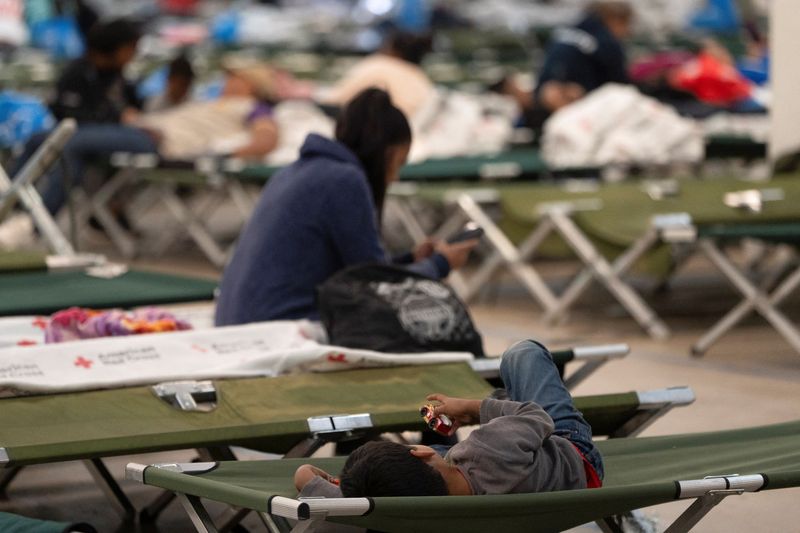By Ted Hesson and Liliana Salgado
WASHINGTON/TUCSON, Arizona (Reuters) - An Arizona migrant shelter that has housed thousands of asylum seekers plans to halt most operations in two weeks when funding from Washington runs out, a problem for towns along the border where officials fear a surge in homelessness and extra costs.
Arizona's Pima County, which borders Mexico, has said that at the end of the month its contracts must stop with Tucson's Casa Alitas shelter and services that transport migrants north from the border cities of Nogales, Douglas and Lukeville.
Pima County Administrator Jan Lesher said the county cannot afford the roughly $1 million per week that previously would have been covered by federal funds.
The amount "is not something that can be easily absorbed into a Pima County budget," she said.
Funding predicaments similar to Pima County's are playing out in other border regions and far-away cities like New York City, Chicago and Denver that have received migrants.
As in Tucson, other local governments anticipate that without federal dollars, communities will face many more migrants living on their streets, greater demands on police, hospitals and sanitation services.
Pima County, which since 2019 has received over 400,000 migrants who have been processed by U.S. border authorities, estimated 400 to 1,000 migrants with nowhere to stay could start arriving daily in Tucson beginning in April.
Congress faces a Friday deadline to fund the U.S. Department of Homeland Security, which pays for migrant services, along with other federal agencies. Current money could be temporarily extended as a stop-gap measure to keep DHS and other federal agencies running.
But additional funding for the shelter and transportation services has been caught in broader political battles about illegal migration and government spending, and Congress is at an impasse, largely due to election-year politics.
Immigration is among the top three concerns for voting-age Americans, and Arizona is an election battleground state that could help decide control of the White House and U.S. Senate.
President Joe Biden, a Democrat running against Republican former President Donald Trump for re-election on Nov. 5, has tried to appeal simultaneously to the Democratic base in favor of protecting asylum seekers while also courting other voters who want to reduce the number of illegal crossings from Mexico.
Biden has grappled with record numbers of such migrants since he took office in 2021.
In recent months, Biden has toughened his stance, blaming Republicans for opposing additional border security funding and legislation that would grant him new enforcement authority.
Republicans counter that Biden should reinstate restrictive Trump policies and end new legal entry programs before Congress devotes more money to border security.
'HOMELESSNESS ON STEROIDS'
Casa Alitas started in 2014 as a church effort to help Central American migrants whom authorities dropped at Tucson's bus station. By 2023 it had served over 180,000 asylum seekers, mostly families, who are legally entitled to stay in the U.S. as they pursue their immigration cases.
While some migrants come from Mexico, Guatemala and other Latin American countries, Casa Alitas has recently housed people from West Africa, India and elsewhere.
At one of five Casa Alitas shelter sites last week, migrants rested on cots and received meals, clean clothes, toiletries and assistance planning onward travel.
Sara Vasquez Gonzalez, 45, came with her husband and three of her six children from Chiapas, Mexico, where cartel violence has driven Mexican families to flee to the U.S.
As they ate breakfast sandwiches, Vasquez said criminals had shot at their house, forcing them to seek refuge in the U.S.
"We lost our house, our corn, our harvest," she said.
Casa Alitas has already told two-thirds of its 60-person workforce that they will be dismissed due to lack of funding, according to Executive Director Diego Lopez.
The shelter plans to reduce its capacity from 1,400 people per day to 140, a level that may not even be enough to house all incoming families with infants and toddlers, he said.
In December, Pima County received 46,000 migrants - more than ever before, according to county figures. Numbers have been just below 30,000 a month in January and February.
In a February memo to Pima officials, Lesher said migrants being released by Border Patrol without shelter services could result in "homelessness on steroids."
Tucson officials are considering setting up a migrant site with bathrooms but no sleeping accommodations. By giving migrants "some place where they can go," the city hopes to avoid people living on the streets and resulting calls on police and emergency services, said county spokesperson Mark Evans.
Arizona Governor Katie Hobbs, a Democrat, last week sent a letter to top U.S. lawmakers on funding committees saying her state needed at least $752 million in shelter funds. In the meantime, Hobbs said in a press conference that her office was working to find ways to deal with the situation.
'STOPPING THE FLOW'
In Congress, lawmakers representing the area are divided on the issue of shelter funding.
U.S. Representative Raul Grijalva, a Democrat who represents part of Pima County and more than 350 miles (563 km) of the Mexico border, called for more federal funds and said Republicans were "continuing to exploit the humanitarian crisis for their political gain."

U.S. Representative Juan Ciscomani, a Republican whose district includes another part of Pima County, said in an interview that Biden should reinstate more restrictive Trump-era policies and increase deportations before Congress provides more money for migrant shelter and transportation.
"We need to focus on what would actually solve the problem, which is stopping the flow at the border," Ciscomani said.